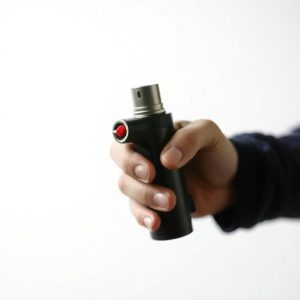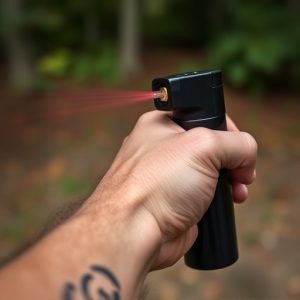Mastering Pepper Spray Defense: Treatment, Care, and Prevention
After pepper spray exposure, act fast. Remove contaminated clothing, rinse eyes and skin with water…….
After pepper spray exposure, act fast. Remove contaminated clothing, rinse eyes and skin with water for 15 minutes, and move to fresh air. For severe symptoms or persistent discomfort, seek immediate medical attention. Follow these steps to minimize pain, promote recovery, and prevent long-term effects of pepper spray exposure.
“Discover the power of pepper spray as a deterrent and learn effective defense mechanisms. This comprehensive guide explores the science behind this powerful self-defense tool, delving into its composition and the intense effects it produces. We’ll navigate through immediate response strategies for treating exposure, offering crucial insights on first aid measures to mitigate pain and discomfort. Additionally, long-term care and prevention techniques are highlighted, providing a holistic approach to managing pepper spray contact. Learn how to effectively prepare and protect yourself with these essential How to Treat Pepper Spray Exposure tips.”
- Understanding Pepper Spray: Its Composition and Effects
- Immediate Response: How to Treat Exposure Effectively
- Long-term Care and Prevention Strategies for Pepper Spray Contact
Understanding Pepper Spray: Its Composition and Effects
Pepper spray, also known as oleoresin capsicum (OC) spray, is a non-lethal self-defense tool designed to temporarily incapacitate an assailant by causing intense irritation and pain in the eyes, nose, and respiratory system. Its primary active ingredient is capsaicin, the same compound that gives chili peppers their heat. When sprayed, capsaicin binds to pain receptors in the target’s body, leading to a burning sensation and temporary blindness, making it an effective deterrent against potential threats.
Understanding how pepper spray works is crucial when considering its use as a defense mechanism. The effects typically last for about 3-5 minutes, during which time the affected individual may experience coughing, difficulty breathing, tears, and a strong, pungent odor. How to Treat Pepper Spray Exposure involves immediate actions like removing contaminated clothing, washing eyes and face with water, and seeking fresh air. Medical attention might be necessary if symptoms persist or severe reactions occur, ensuring swift recovery and minimizing long-term effects.
Immediate Response: How to Treat Exposure Effectively
In the event of exposure to pepper spray, an immediate and effective response is crucial to mitigate its intense effects. The first step is to get to a safe, open-air location as soon as possible. Removing any contaminated clothing or footwear carefully is essential; do not rub the eyes or face, as it can exacerbate irritation. Rinsing the affected area with plenty of clean water for at least 15 minutes helps wash away the spray residue.
For eye exposure, flushing with water or using eye rinse solutions can provide some relief. If breathing becomes difficult, moving to fresh air is paramount. In cases of severe symptoms, seeking medical attention promptly is vital. Understanding how to treat pepper spray exposure can make all the difference in minimizing discomfort and ensuring swift recovery.
Long-term Care and Prevention Strategies for Pepper Spray Contact
After exposure to pepper spray, proper long-term care and prevention strategies are essential to mitigate discomfort and avoid potential complications. The first step in treating pepper spray exposure is to immediately rinse the affected area with large amounts of clean water for at least 15 minutes. This helps to dilute and flush out the irritant chemicals. If eye contact occurs, hold the affected eyes open and continue rinsing until any burning sensation subsides.
For skin contact, remove any contaminated clothing or jewelry promptly, ensuring not to rub or scratch the affected area. Apply a cold compress to reduce swelling and provide temporary relief from pain and irritation. It’s crucial to avoid using alcohol-based products or scratching, as these actions can exacerbate the situation. Additionally, seeking medical attention is recommended, especially for severe reactions or if symptoms persist beyond a few hours. How to treat pepper spray exposure effectively involves combining at-home care with professional medical guidance to ensure complete recovery and prevent future incidents.
Pepper spray can be a frightening experience, but understanding its composition and effects is the first step towards effective treatment and prevention. By knowing how to respond immediately after exposure, as well as implementing long-term care strategies, individuals can better protect themselves against pepper spray deterrents. Remember, prompt action and proactive measures are key to mitigating the impact of pepper spray and ensuring overall safety.


